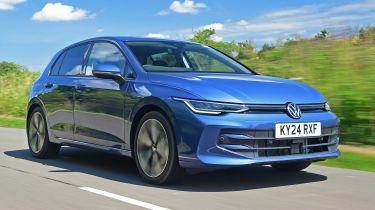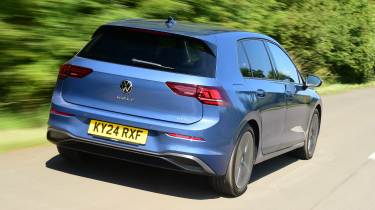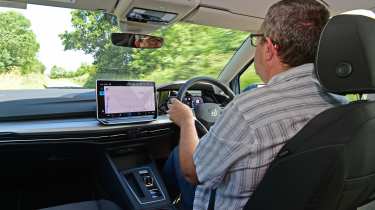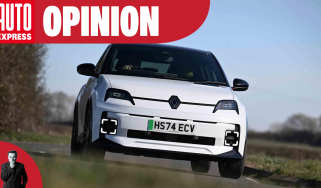New Volkswagen Golf 2024 facelift review: updates are a step in the right direction
The Volkswagen Golf has been updated to keep it competitive against the likes of the Skoda Octavia and Honda Civic

Verdict
The Volkswagen Golf doesn’t quite define the family-car segment in the way that it used to – a Skoda Octavia is more practical, and it remains better value – but there’s no denying that some well-judged tweaks have made VW’s icon better aligned with its own values than it has been for some time. It’s not exactly cheap, but it is well equipped, generally comfortable, neatly finished and, for many people, just the right size. The mild-hybrid powertrain does a good job of boosting its efficiency, too.
Volkswagen might be pushing ahead with its plans for all-electric vehicles, but the German brand can’t afford to forget the bread-and-butter models needed to keep the sales figures up in the meantime. And they don’t come any more ‘core’ than the Golf, which has received a nip and a tuck to nudge it from Mk8 to Mk8.5, timed beautifully to coincide with the car’s 50th birthday.
And boy, are the stakes high with this one – because it’s widely accepted that VW made a few key errors with the eighth-generation Golf, in areas, such as usability, that have been central to the model’s DNA over the past five decades. These gaffes, in turn, coincided with doubts about the model’s long-term future that have only recently been settled by the company CEO. There will be a Mk9 Golf. It will be electric. But for the time being, there’s probably never been an iteration of the iconic hatch as crucial as this Mk8.5. And now it’s our first chance to see if the changes have managed to get it back on track.
Used - available now
From the outside, the modifications look subtle enough – as you might expect from a mid-life update of a car that has moved through the years in evolution, rather than revolution. There’s a fresh design of LED lights at the front and rear, a new front bumper and, at last, the VW badge on the nose can be illuminated. The rear also gets a restyled bumper, and there are also different alloy wheel designs and four new metallic-paint colours.
There are a few updates to the oily bits, and as we’ve seen elsewhere in the VW Group (most notably the latest Skoda Octavia), the old three-cylinder 1.0-litre motor has been dropped. The most basic engine in the Golf is now a 1.5-litre turbocharged four-cylinder petrol, producing either 114bhp or 148bhp. There’s also a pair of 2.0-litre diesels with the same power outputs, and a tweaked 2.0-litre TSI petrol engine that now produces 201bhp, up 13bhp on the previous iteration.
There are more electrified options than before, with the choice of two mild hybrids, badged eTSI, that retain the 1.5-litre petrol engines, complete with the same power figures, but add an electric motor that can take over completely when you’re cruising along, to help save fuel. You get this tech as standard if you want your petrol Golf to have a seven-speed DSG dual-clutch automatic gearbox instead of the regular six-speed manual.
There are still two plug-in hybrids in the line-up, but they both get a hike in battery capacity, to 19.7kWh, to help deliver better electric-only range than we’ve ever seen in a Golf before. The 1.5 petrol-based eHybrid sticks with its previous output (201bhp) while the more performance-focused GTE gets a power boost to 268bhp. Either way, your plug-in Golf will deliver anywhere between 82 and 88 miles of EV range, which means both versions drop into the five-per cent Benefit-in-Kind tax rate for company-car choosers.
The more significant revisions occur in the cabin – specifically on the dashboard and steering wheel, where VW has moved to correct some of the flaws that outraged so many Golf Mk8 buyers. The infotainment panel retains the dreaded ‘slide bar of doom’, which still controls the temperature at either side and the stereo volume in the middle. But it’s supposed to be more responsive than before, and it is also backlit – so you won’t end up making the car’s interior like a blast furnace every time you want to turn up your favourite music through the speakers on a late-night drive home.
On the wheel, meanwhile, the old haptic slider controls have been dumped, replaced by good old-fashioned buttons and switches that ought to, well, just work as buttons and switches should. Who’d have thought it?
The range starts with Life, which brings what looks like a useful standard-equipment list. It features 16-inch alloy wheels, climate control, wireless smartphone integration, cruise control, front and rear parking sensors, a digital instrument panel and the latest MIB4 infotainment system, based on the same 12.9-inch display that’s present across the entire range. But more on that later.
Step up to Match, a traditional value sweet spot in the Golf, and you’ll move to 17-inch wheels and also get rear tinted glass, a rear-view camera, keyless entry and go, and high-beam assist. Style adds the illuminated VW logo on the front grille, along with fancier interior trim, ambient cabin lighting, three-zone climate control and sports seats.
Move beyond these levels and you’re into sporty-themed versions like R-Line (sports suspension, diamond-cut alloys and a heated sports steering wheel), Black Edition and GTE, which aligns with the revamped GTI and offers matrix-LED headlights and heated front seats (which are an on-demand feature on more modest variants).
We’re driving the Match, equipped with the more potent eTSI powertrain. VW reckons this could be the second most popular combination in the range, after the regular 148bhp manual. And we can see why it would appeal. The engine itself isn’t the most sonorous creation but it spins up pretty smoothly (those stepping up from the old three-cylinder unit should find it noticeably more polished) and it delivers its 250Nm of torque from as low as 1,500rpm.
As is often the case, the DSG transmission is perfectly happy to make slick, swift shifts once you’re up and running, and it’s well calibrated, allowing you to maintain a decent lick without ever really feeling like you’re stressing the engine. The mild-hybrid system provides a slug of extra low-down punch, and also helps to smooth out transitions when, for example, your throttle-pedal position reaches the point where the engine is running on two cylinders. Of course, its integration with the auto box means that it can also turn petrol power off completely when you’re cruising downhill, for example.
The two-cylinder mode seems to kick in much more frequently than pure-electric running (VW reckons the engine can run on half of its cylinders during 70 per cent of the statutory EU driving cycle), but in general the mix of eco features isn’t likely to affect your progress, beyond saving you a bit of fuel. The official number is 52.6mpg, so you should see high forties in real-world use.
The 114bhp Golfs make do with a torsion-beam rear suspension set-up but the rest of the petrol versions get a multi-link rear end, to complement the MacPherson-strut configuration at the front. There’s a keenness to the steering that wouldn’t be out of place in the GTI, with crisp response on turn-in and consistent, dependable weighting. It’s surprisingly easy, in fact, to lean on the Golf in corners, trusting the balance and commendable body control. In this respect, at least, the car remains one of the best-judged offerings in the class. We’d even go as far as to describe it as fun – with 148bhp and electric-motor assistance to play with, at least – as long as the intrusive lane-keep assist doesn’t kick in too often.
The trade-off in ride comfort isn’t horrendous; our test car was fitted with optional 18-inch wheels, which had a slight tendency to seek out road imperfections and transmit them through to the cabin. The Bridgestone rubber was probably the worst offender on noise, too, especially on more open, porous asphalt. But on the whole, the Mk8.5 Golf does manage to deliver more engagement than you might expect, with higher levels of comfort and refinement than you might fear.
Inside, there’s a pleasing mix of high-quality finishes and materials, even if the Golf isn’t the dominant class benchmark that it once was. The driving position is excellent and even in a car with an overall length of less than 4.3 metres, there’s space here for four grown-ups. The boot isn’t the largest in the class, at 381 litres, but like the rear cabin, it’s probably big enough for most families. If you’ve found a Golf big enough before, you won’t be disappointed here.
The front cabin is still dominated by the huge 12.9-inch infotainment system, but the good news is that the MIB4 operating system is more intuitive to use than its predecessor, complete with the scope for shortcuts that allow you quicker access to your favourite functions. VW’s boffins have copied Skoda’s in configuring a permanent bar at the bottom of the interface for elements like the heated seats, and this works reasonably well.
The touch slider does seem to be more detailed in its responses – you can nudge the volume up and down by just rocking your finger from side to side in the middle, for example – and backlighting should make it more usable at night. But it’s a pity that while the facelift has allowed these updates, it hasn’t stretched to the multi-function physical dials that work so well in the latest Skoda Superb and Kodiaq. Expect those to appear in the Mk9, as VW continues working to right its own wrongs.
| Model: | Volkswagen Golf Match 1.5 eTSI 150PS DSG |
| Price: | £28,850 (£32,155) |
| Engine: | 1.5-litre 4cyl turbocharged MHEV petrol |
| Power/torque: | 148bhp/250Nm |
| Transmission: | Seven-speed dual-clutch auto, front-wheel drive |
| 0-62mph: | 8.4 seconds |
| Top speed: | 138mph |
| Economy: | 52.6mpg |
| CO2 emissions: | 122g/km |
| Size (L/W/H): | 4,282mm/1,789mm/1,483mm |
| On sale: | Now |










